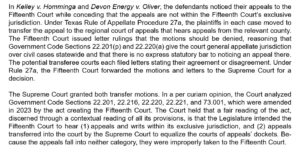 McDonald v. Four Rivers Devel., LLC addressed, inter alia, an issue of trial by consent. The appellant argued that the trial court erred in admitting evidence about a “25% profit margin requirement,” but the Fifth Court noted that the appellant mentioned the 25% profit margin in opening statement and asked about it during direct examination, thereby making the issue relevant–before later objecting to further evidence on the subject. No. No. 05-24-00431-CV (March 28, 2025) (mem. op.). (My partner John Volney and I wrote this article in Headnotes a couple of years ago about then-recent Fifth Court cases on similar trial-by-consent issues.)
McDonald v. Four Rivers Devel., LLC addressed, inter alia, an issue of trial by consent. The appellant argued that the trial court erred in admitting evidence about a “25% profit margin requirement,” but the Fifth Court noted that the appellant mentioned the 25% profit margin in opening statement and asked about it during direct examination, thereby making the issue relevant–before later objecting to further evidence on the subject. No. No. 05-24-00431-CV (March 28, 2025) (mem. op.). (My partner John Volney and I wrote this article in Headnotes a couple of years ago about then-recent Fifth Court cases on similar trial-by-consent issues.)
Monthly Archives: March 2025
 The Dallas division of the Business Court recently addressed contractual modification of partnership duties in Primexx v. Primexx, (March 9, 2025). Consistent with the supreme court’s general theme in Energy Transfer v. Enterprise, 593 S.W.3d 732 (Tex. 2020), that statutory partnership-formation requirements can be modified, Primexx held that a partnership agreement had effectively limited the (nonwaivable statutory) duties of loyalty and care to the fullest extent permitted by Texas law.
The Dallas division of the Business Court recently addressed contractual modification of partnership duties in Primexx v. Primexx, (March 9, 2025). Consistent with the supreme court’s general theme in Energy Transfer v. Enterprise, 593 S.W.3d 732 (Tex. 2020), that statutory partnership-formation requirements can be modified, Primexx held that a partnership agreement had effectively limited the (nonwaivable statutory) duties of loyalty and care to the fullest extent permitted by Texas law.
Specifically, the Court found that the agreement allowed the controlling partner to act in its sole interest and discretion, provided it met the minimum statutory requirements under the Texas Business Organizations Code. While the agreement limited the fiduciary duties, it did not eliminate the obligation to act in good faith. And the good faith obligation of the TBOC does not rise to the level of a separate fiduciary duty but requires parties to “deal fairly” with each other.
Accordingly, the controlling partner’s actions in exercising its “drag-along” rights and forcing the sale of the partnership’s business were within the bounds of the modified fiduciary duties as outlined in the agreement.
In a flashback to a common area of litigation in 2017-18, Ruff v. Ruff addresses the applicability of the TCPA to claims involving the signing and filing of a deed. The appellant argued that her actions were protected by the TCPA as they were based on her exercise of the right to petition. The Fifth Court saw matters otherwise, concluding: “[T]he events on which Suzann’s claims are factually predicated are Jennifer’s signing and filing the deed, which were not communications in or pertaining to a judicial proceeding.” No. 05-24-00095-CV, Mar. 10, 2025 (mem. op.).
 Kennedy v. NCAA addressed the issue of whether the plaintiffs’ claims about CTE were barred by limitations. The Fifth Court reversed the trial court’s summary judgment in favor of the NCAA, holding that the NCAA did not conclusively establish that defense.
Kennedy v. NCAA addressed the issue of whether the plaintiffs’ claims about CTE were barred by limitations. The Fifth Court reversed the trial court’s summary judgment in favor of the NCAA, holding that the NCAA did not conclusively establish that defense.
The Court found fact issues as to when the plaintiffs knew, or should have known through the exercise of reasonable diligence, that their father’s injury was likely related to his participation in college football. It considerd several specific events, including: the plaintiffs’ opt-out from a class-action settlement in 2017, an October 2, 2015 email inquiry about CTE, an August 18, 2014 intake questionnaire reporting head trauma from college football, a note by a doctor on October 8, 2015, and a 1998 conversation between the decedent and his brother about cognitive decline potentially related to football. No. 05-23-00958-CV, Mar. 25, 2025 (mem. op.).
The supreme court’s detailed review of a takings issue in Commons of Lake Houston v. City of Houston turned on this basic point:
“[W]e have long rejected ‘the notion that the government’s duty to pay for taking property rights is excused by labeling the taking as an exercise of police powers.’ Indeed, whether a regulation constitutes a valid exercise of the police power—or promotes any other important public policy, purpose, or interest—is simply irrelevant to whether the regulation causes a compensable taking.”
No. 23-0474 (Tex. March 21, 2024) (citations omitted).
MPI Indus. Carolinas, LLC v. CTE Networks LLC reversed the denial of a special appearance, noting that the work performed under the disputed agreement occurred in North Carolina and South Carolina, and that the plaintiffs’ unilateral activities, such as sending invoices from Texas, were irrelevant to the jurisdictional analysis. No. 05-24-00560-CV (March 11, 2025) (mem. op.).
 To challenge a remand order by the new Business Court, the path to take is a mandamus petition rather than direct appeal, as recently confirmed by In re ETC Field Services LLC, from the 15th Court of Appeals on February 21:
To challenge a remand order by the new Business Court, the path to take is a mandamus petition rather than direct appeal, as recently confirmed by In re ETC Field Services LLC, from the 15th Court of Appeals on February 21:
ETC appealed the remand order to this Court. Tema moved to dismiss the appeal on the ground that it was not a final order and no statute authorized an interlocutory appeal.2 ETC defended the interlocutory appeal, but alternatively filed this original proceeding for mandamus relief if interlocutory appeal was unavailable. We hold today that no interlocutory appeal is available in these circumstances. … “But that of course does not preclude mandamus review.” “[T]he Legislature’s decision to forego interlocutory review of all pending cases in no way suggests it intended interlocutory review of none of them.” Accordingly, we turn to that issue in this opinion.
No. 15-24-00131-CV (15th Ct. App.) (citations and footnotes omitted).
 In Elsell v. Encore Wire Corp., the Fifth District reversed a defense summary judgment, finding a genuine issue of material fact about the credibility of the reasons provided for Plaintiff Elsell’s termination. Interestingly, the panel consists of three newly-elected Justices, two of them Republicans. The Court noted two points:
In Elsell v. Encore Wire Corp., the Fifth District reversed a defense summary judgment, finding a genuine issue of material fact about the credibility of the reasons provided for Plaintiff Elsell’s termination. Interestingly, the panel consists of three newly-elected Justices, two of them Republicans. The Court noted two points:
- Encore’s director of human resources, Ronald Bouchard, claimed he fired Elsell for lying about being coerced into signing a document. However, Bouchard’s heavy reliance on the credibility of Jimmy Davis, another employee was terminated by Bouchard for document fraud and dishonesty, created a factual dispute about whether Bouchard genuinely believed Elsell was lying or if the stated reason for termination was a pretext for retaliation.
- Bouchard’s interview with Elsell was brief and lacked thorough investigation. Bouchard did not ask Elsell why he felt coerced and instead presumed the nature of the alleged coercion.
Therefore, “reasonable and fair-minded persons could differ on whether Bouchard’s stated reason for firing Elsell was actually based on an interview of Elsell that was objectively brief, conjectural, and uninformed.” No. 05-23-00588-CV, Mar. 14, 2025 (mem. op.).
 Miles-Edmond v. Skillman Prop. Inv. Dallas LLC addressed “Malooly” issues and the need for appellants to challenge all potential bases for a trial court’s summary judgment ruling.
Miles-Edmond v. Skillman Prop. Inv. Dallas LLC addressed “Malooly” issues and the need for appellants to challenge all potential bases for a trial court’s summary judgment ruling.
A general issue that the trial court erred in granting the motion for summary judgment might be sufficient to allow argument on all possible grounds. However, the appellant must then, in fact, substantively attack each basis upon which the summary judgment could have been granted.
Here,”[b]ecause the summary judgment could have been based on these no-evidence grounds, and because Miles-Edmond failed to challenge these grounds, we must affirm the trial court’s summary judgment.” No. 05-23-00789-CV (mem. op.) (Feb. 24, 2025).
